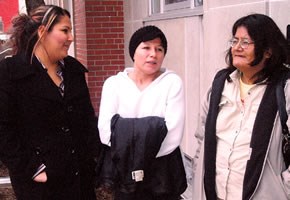BY KEITH LACEY
A man who brutally beat a grandfather and then strangled him to death during a drunken rage 20 months ago was given a seven-year penitentiary sentence Wednesday.
The sentence is on top of 20 months John Edlord Toulouse, 42, has already spent behind bars since being arrested for second-degree murder in the death of Romeo Jules Eshquib on April 29, 2005. Toulouse pleaded guilty to manslaughter.
Members of Eshquib’s family said they have no choice but to accept what has happened, but some of them were not happy with what they deemed an insufficient penalty.
“I feel let down quite a bit and ripped off because we’ll never see our father again and this man will probably get out of jail one day and still have a life to live,” said Eva Modeste, on the steps of the Sudbury Courthouse.
“His family can still hug and talk to him. We have nothing.”
Justice Louise Gauthier of the Ontario Superior Court of Justice said no sentence could bring back Eshquib, a father of 12 children and numerous grandchildren, but she agreed to the seven-year sentence proposed by assistant Crown attorney Kenrick Abbott and defence lawyer Glenn Sandberg.
“The accused was more than 20 years his junior...Mr. Eshquib could not defend himself against this brutal attack,” said Gauthier.
In a highly emotional sentencing hearing, the court heard Eshquib was a father and grandfather.
It was also revealed Eshquib and Toulouse were friends who often drank alcohol together.
No motive or reason for the attack was presented as Sandberg said Toulouse was so intoxicated after drinking large amounts of ethyl alcohol he doesn’t remember anything about the attack.
The attack was brutal as Eshquib was found to have sustained numerous broken ribs on both sides of his body as well as a broken sternum, lacerations and bruising of his head and cuts and bruises to many other parts of his body.
A physician who conducted the post-mortem said the injuries sustained by Eshquib were among the most severe he had seen not causing death. It was his opinion the actual cause of death was manual strangulation following a severe beating.
The broken ribs and sternum were consistent with “being kneed, stomped or jumped on” repeatedly, said Abbott, in reading in an agreed statement of facts.
The manual strangulation was also brutal as Eshquib suffered three fractures of his larynx.
Abbott told the court police found Eshquib laying face down on the ground with most of his torso contorted on some stairs at a residence on St. Charles St. in the Flour Mill area.
Within minutes of finding Eshquib’s body, police located Toulouse, who was obviously under the influence of alcohol, said Abbott.
Both men were captured on a surveillance camera outside a grocery store in the hours before Eshquib was killed.
Several neighbours saw them gather inside Toulouse’s apartment.
One neighbour described Eshquib as “a little intoxicated,” while Toulouse was “very intoxicated” when she saw them together in the hours before violence erupted, said Abbott.
One neighbour heard loud music, and then a very loud bang coming from Toulouse’s apartment in the hours before Toulouse knocked on her door around 3 am asking for food.
When the same female neighbour awoke around 7 am, she found Eshquib’s body and phoned police.
Abbott told the court Toulouse had blood on the side of his face when police arrived. An investigation revealed he had removed clothing from the scene and tried to wipe off mud from a pair of shoes he owned.
At one point, Toulouse told a neighbour if Eshquib was dead he was going to take his own life, said Abbott.
Samples of DNA taken from liquor bottles inside Toulouse’s apartment matched the deceased and accused and small strands of clothing also matched those worn by Eshquib.
The only injuries suffered by Toulouse were some small scratches on his wrist and chest, said Abbott.
Sandberg said his client has had a very difficult life where alcohol abuse has been the only constant since childhood.
While his client won’t submit to the court “it wasn’t me, but the booze” which made him act out so violently, it can’t be ignored Toulouse had near-toxic levels of alcohol in his system when this incident occurred, said Sandberg.
Toulouse grew up in a family of 10 children where his parents constantly abused alcohol. He started sniffing gas at a young age and he was eventually removed for his parent’s home and placed in foster care, where he was moved around a lot throughout his younger years.
Because of his alcohol addiction, Toulouse has been unable to hold down a job, Sandberg said.
Toulouse has had three common-law relationships and fathered five children.
“He has throughout his 42 years lived a life of turmoil, conflict and destruction,” he said.
Toulouse has sought counselling for alcohol addiction and other psychological problems, but this will not provide any comfort to Eshquib’s family. It might ensure a similar incident doesn’t happen again, said Sandberg.
Abbott said finding an appropriate sentence is difficult in such a troubling case.
“This was not a fight...at the time he was killed, Romeo Eshquib could not fight back,” he said.



.jpg;w=120;h=80;mode=crop)